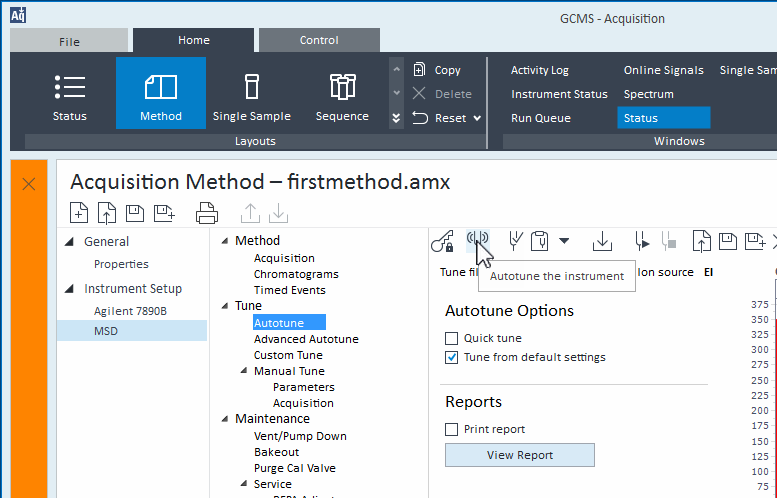Default Tune Files
Default Tune File Names and Types
OpenLAB provides the following default tune files. The default files listed in the Open Tune File dialog box are based on your configured instrument.
|
File Name |
Tune Type |
CI Reagent Gas |
Ion Source |
|
Atune |
Atune |
N/A |
EXTractor and EI |
|
Etune |
Etune |
N/A |
EXTractor |
|
Stune |
Stune |
N/A |
EXTractor and EI |
|
HES_atune |
HES_atune |
N/A |
High Efficiency |
|
ncich4 |
ncich4 |
Methane in port A (CI instrument) |
CI |
|
ncinh3 |
ncinh3 |
Ammonia in port A (CI instrument) |
CI |
|
pcich4 |
pcich4 |
Methane in port A (CI instrument) |
CI |
|
pcinh3 |
pcinh3 |
Ammonia in port A (CI instrument) |
CI |
The Tune Type indicates the tune algorithm that is used to tune the instrument.
-
Atune - Autotune calibrates the mass analyzer and ion source conditions to yield good results with the stainless steel, inert, and extractor ion sources.
-
Etune - This version of Autotune adjusts the ion body and extractor lens for greater sensitivity than the tune type Atune.
-
Stune - This is a target tune supplied by Agilent to achieve mass spectral results similar to older HP 597x instruments. This algorithm is less sensitive than an Etune or an Atune and new applications should avoid this tune type.
-
HES_Atune - This is the only tune algorithm for the High Efficient Source. It is much more sensitive than the other autotunes.
-
ncich4 - Tune file for negative ions. Methane in port A. (CI instrument)
-
ncinh3 - Tune file for negative ions. Ammonia in port A. (CI instrument)
-
pcich4 - Tune file for positive ions. Methane in port A. (CI instrument)
-
pcinh3 - Tune file for positive ions. Ammonia in port A. (CI instrument)
Tune Types with an Asterisk (*)
An autotune file (except an Stune) may be converted into a Target Tune file with a new name. If you modify any parameter on the Custom Tune window, the Tune Type will be displayed with an asterisk (e.g., Atune*, Etune*).
Restoring a Tune File Type to its Default Criteria
A tune file that has been customized will have an asterisk appended to its Tune Type (e.g., Atune*) This procedure restores a customized autotune to the original Agilent algorithm.
- Request tune control.
- Load the tune file.
- With the customized tune file loaded, on the Method screen
 select Instrument Setup > MSD > Tune > Autotune.
select Instrument Setup > MSD > Tune > Autotune. - Under Autotune Options, check the Tune from default settings check box.
- Click Autotune the instrument
 .
. - Click Save the tune parameters
 to save the changes.
to save the changes. - Release tune control.

The following happens:
- The file name remains unchanged
- The asterisk is removed from the Tune Type
- For a target tune, ion percentages are set to the default Stune file settings